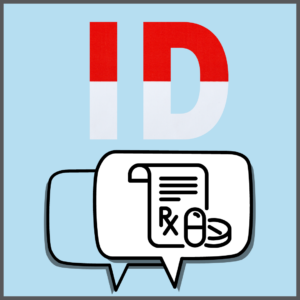
Indonesia has been working on pharma serialization regulations and their implementation since 2017. By 2025, all prescription drugs must be serialized and equipped with a 2D data matrix code. A QR code requirement for OTC and processed foods, among others, will apply as early as 2023.
Title: BPOM Regulation #33/2018 Implementation of 2D barcode in order to improve the effectiveness of medicines and processed food supervision.
Competent authority: National Agency of Drug and Food Control, BADAN POM (BPOM).
Products: Medicines, traditional medicine, food supplements, cosmetics, processed food, and certain raw materials.
Code type: GS1 2D Data Matrix (authentication) or QR code (identification)
Aggregation: yes, according to GS1 standards
Timeframe: Start 2017/2018; by 2023, all products must have an identification barcode; an authentication barcode is mandatory for all narcotics and psychotropics until December 7, 2025, and for all “hard drugs” (BPOM term) until December 7, 2027
As in many other regions of the world, Indonesia has been in the process of establishing an effective serialization and identification system for the pharmaceutical industry and other product groups for several years. These include dietary supplements, cosmetics, and traditional medicine. The government’s goal is to increase the national competitiveness of Indonesia’s pharmaceutical and food industries and to improve product safety.
To achieve these goals, controls and guidelines are being expanded and aligned with international standards. They include everything from drug registration and marketing authorization validation to post-market surveillance.
Differences between the Identification and the Authentication Code
Pharmaceutical companies in Indonesia are required to use 2D codes that enable the tracking and tracing of medicines. For their track-and-trace system, manufacturers are expected to comply with GS1 standards.
Whether an identification or authentication number must be provided depends on the type of product. Products that do not need to be serialized will only need an identification barcode. However, this will become mandatory as early as 2023. Among the product types that require an identification code are not only pharmaceutical products. In addition to over-the-counter (OTC) medicines and traditional medicines, cosmetics, and processed foods also fall under the identification requirement.
The identification code must contain the following information:
- Marketing Authorization Number
- NIE Number
The NIE Number (Nomor Izin Edar) is a license number issued by the BPOM. Various product master data must be provided for the application and, if applicable, must also be submitted in Indonesian. It consists of a combination of letters and numbers. The number of characters and length depend on the type of product. The number can be used, for example, to read whether the product was manufactured domestically or abroad, and it gives access to further product data in the Indonesian database Cek Produk BPOM.
Starting in 2025, prescription drugs must be serialized and equipped with an authentication barcode. The BPOM also reserves the right to add further product types to the list of products requiring serialization.
The authentication code must contain the following information
- Product identification number, e.g. GS1 GTIN
- Marketing Authorization Number (BPOM)
- Production code or batch number
- Expiration date
- Serial number
Aggregation and other Specifications
The government has made aggregation mandatory from the packaging level, extending the legislation in 2020. In contrast, the exact specifications for randomization of the serial number or the format of the human-readable expiration date are still pending and will be gradually added or adapted.
Since it is possible to have different barcodes on a package, the BPOM requires that when more than one barcode is used on the drug package, the authentication code must include the suffix “BPOM RI.”
The product data, including aggregation data, must be reported to the BPOM. In addition, the data may need to be reported to additional trading partners.
Prepare Serialization for Indonesia in Time
Due to the deadlines of 2023 for e.g., OTC drugs and dietary supplements, as well as 2025 and 2027 for the implementation of serialization, the pharmaceutical industry, and the other affected industries have to act in time to implement the correct labeling for the Indonesian market. Pharmaceutical serialization in particular is a project that requires a certain lead time in order to be implemented correctly due to the complex regulations that have not yet been fully formulated in some areas. Not only the manufacturers themselves are affected, but also contract manufacturers, importers, and other players along the supply chain must be integrated into new processes.
[Disclaimer]This information is only one possible interpretation of the regulations. They are also in a constant state of change, so the information in this article may be incomplete or out of date. The above article is expressly no legal advice. Please refer to the official documents for information before making any business decisions. (Status of information: June 2024)